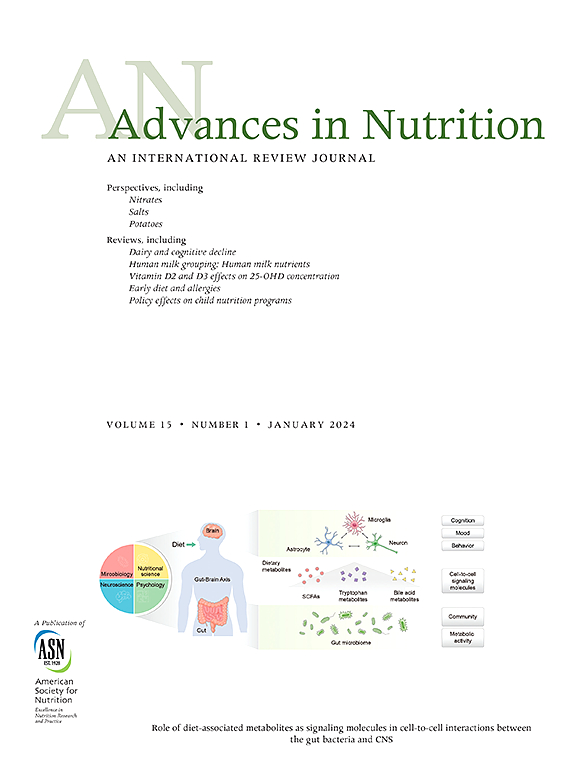将营养生态学纳入营养护理连续体的价值-一种概念和系统方法。
IF 9.2
1区 医学
Q1 NUTRITION & DIETETICS
引用次数: 0
摘要
国内和全球的饮食、营养和健康状况正变得越来越复杂。我们有效应对各种形式的营养不良带来的严峻挑战的能力——无论是从临床角度还是从公共卫生角度——受到一些问题的限制,这些问题围绕着我们对营养的理解以及对营养的评估是什么、为什么和如何进行的理解。当筛查、评估、诊断和护理往往在不同的环境(医院、学校、家庭)中进行时,这种复杂性进一步增强,跨越人群,并且护理团队有限(例如,某些护理团队可能只有一个学区内的护士或营养师)。从这个角度来看,我们认为我们提高评估、诊断和干预的准确性的能力需要将营养视为一个生物学变量:一个由我们的内部(生物学、健康状况、发育阶段、遗传学等)和外部(健康的社会决定因素、家庭、社区、物理)环境之间相互作用产生的复杂系统,即营养生态学。我们提供:(i)一个概念性框架,以便更有效地将营养纳入医疗评估和基于病因的护理;(ii)提出解决方案,以克服临床护理连续体中的一些系统性挑战。利用营养作为生物变量的概念,强调将内部和外部变量整合到营养护理过程模型中的评估中,既可以确定营养问题,也可以确定问题的根本原因(病因学)。从临床和公共卫生的角度对如何整合这一方法提出了建议。本文章由计算机程序翻译,如有差异,请以英文原文为准。
The Value of Integrating the Nutritional Ecology into the Nutrition Care Continuum—A Conceptual and Systems Approach
The domestic and global diet, nutrition, and health context is becoming increasingly complex. Our ability to effectively address the daunting challenges presented by malnutrition in all its forms—both clinically and from a public health perspective—is constrained by a number of issues that coalesce around our understanding of nutrition and the what, why, and how of its assessment. This complexity is further enhanced when screening, assessment, diagnosis, and care are often performed in different settings (hospital compared with school compared with home), across populations, and with a limited care team (e.g. certain care teams may only have a nurse or dietitian within a school district). In this perspective, we make the case that our ability to improve the precision of assessment, diagnosis, and intervention demands a view of nutrition as a biological variable: a complex system resulting from the interactions between our internal (biology, health status, developmental stage, genetics, etc.) and external (social determinants of health, home, community, physical) environments, i.e. a nutritional ecology. We offer both 1) a conceptual framework for more effectively integrating nutrition in medical assessment and etiology-based care; and 2) suggest solutions to overcome some of the systematic challenges in the clinical care continuum. Leveraging the concept of nutrition as a biological variable that emphasizes the integration of both internal and external variables into an assessment within the Nutrition Care Process model allows for both the identification of the nutrition problem and also the root cause (etiology) of the problem. Suggestions are offered for how to integrate this approach from both a clinical and public health perspective.
求助全文
通过发布文献求助,成功后即可免费获取论文全文。
去求助
来源期刊

Advances in Nutrition
医学-营养学
CiteScore
17.40
自引率
2.20%
发文量
117
审稿时长
56 days
期刊介绍:
Advances in Nutrition (AN/Adv Nutr) publishes focused reviews on pivotal findings and recent research across all domains relevant to nutritional scientists and biomedical researchers. This encompasses nutrition-related research spanning biochemical, molecular, and genetic studies using experimental animal models, domestic animals, and human subjects. The journal also emphasizes clinical nutrition, epidemiology and public health, and nutrition education. Review articles concentrate on recent progress rather than broad historical developments.
In addition to review articles, AN includes Perspectives, Letters to the Editor, and supplements. Supplement proposals require pre-approval by the editor before submission. The journal features reports and position papers from the American Society for Nutrition, summaries of major government and foundation reports, and Nutrient Information briefs providing crucial details about dietary requirements, food sources, deficiencies, and other essential nutrient information. All submissions with scientific content undergo peer review by the Editors or their designees prior to acceptance for publication.
 求助内容:
求助内容: 应助结果提醒方式:
应助结果提醒方式:


